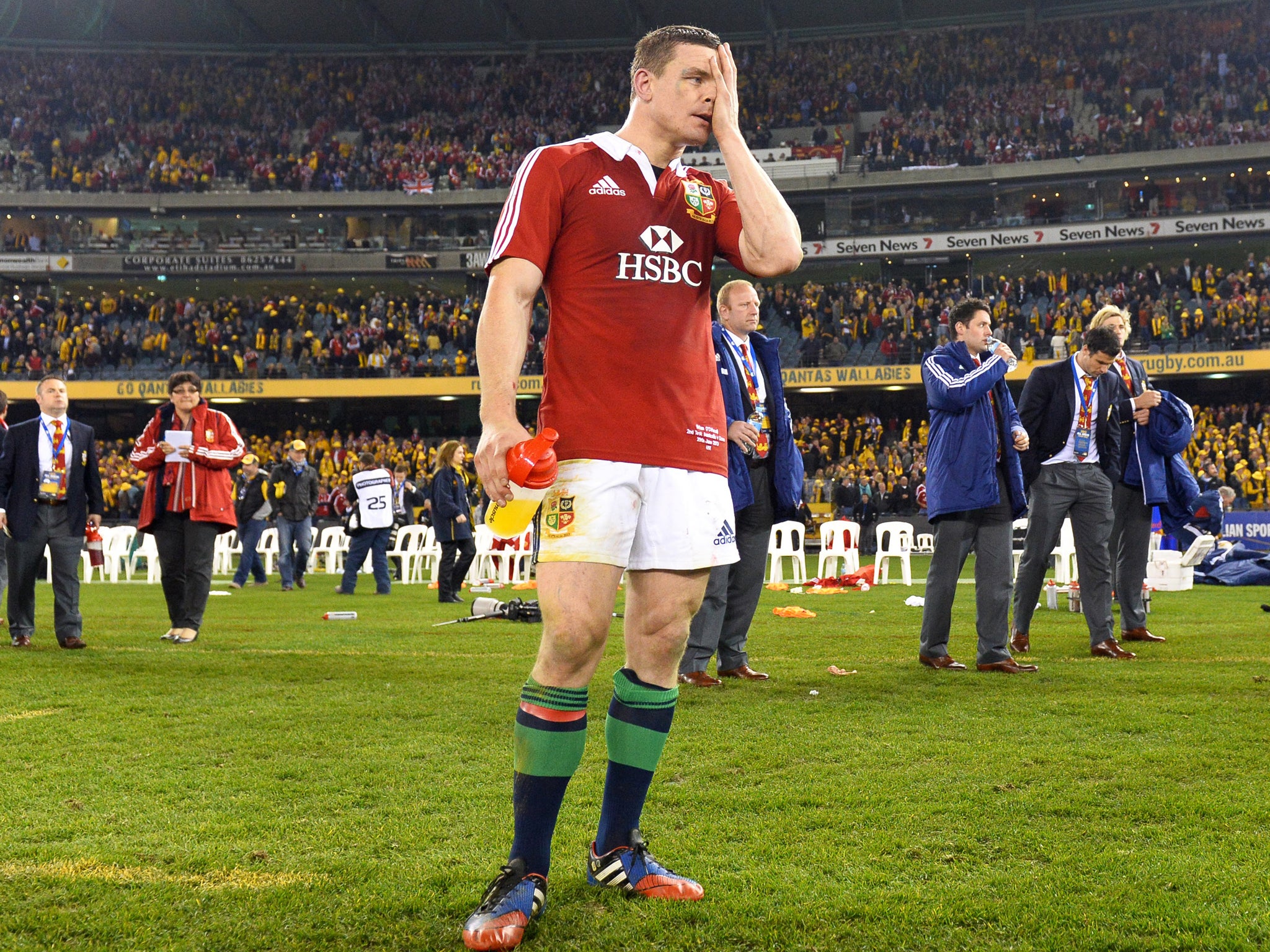Time waits for no one – not even true greats like Brian O’Driscoll
Ireland centre is entering his final season of professional rugby, and Robin Scott-Elliot takes a look at where the 34-year-old finds himself after a testing summer of Lions rugby

There are not many opportunities left to see one of the modern greats of rugby union with ball in hand, tearing across the turf in that harum-scarum style, the one that seems to be hurtling him up a blind alley only for a jink and a drop of the shoulders to suddenly usher himself or a team-mate into green acres of space.
There has become too easy a willingness to genuflect before sportsmen and women today, promoting them into a sporting Valhalla on the back of a couple of inspirational moments. But in the case of Brian O’Driscoll there can be no quibbling over his place in the Pantheon. There is one more campaign in the blue shirt of Leinster, and, given form and fitness and barring a seismic call by the Ireland coach Joe Schmidt, one last autumn and spring in the emerald green.
Dropping O’Driscoll is not something any coach does lightly. Ask Warren Gatland. Last week O’Driscoll disclosed his true thoughts on the decision that consigned him to shirt, tie and blazer on the Lions’ lap of honour in Sydney. It was delivered as politely as ever but was nevertheless more than enough to reveal the lingering pain, and also where O’Driscoll believes he still stands in rugby’s pecking order.
The rights and wrongs of Gatland’s call have been exhaustively debated but there was a good case for leaving O’Driscoll out. He is not the player he was. How could he be at 34 with more than a dozen bruising years of international rugby behind him? He recognises his time is drawing to a close and has insisted that this season is the last – a decision he reached after assurances from Leinster and Schmidt that he was still wanted for club and country. It will be fascinating to see how his finale unfolds.
The two most recent images of O’Driscoll that spring to mind are not ones that match the garlanded career. Firstly sitting grim-faced on that bench in Sydney and a little further back to this year’s Six Nations, stranded on a chair pitchside in Rome, sin-binned and powerless to prevent Ireland from slumping to depressing defeat. The frustration screamed from the TV.
The end of a great career can provide drama as gripping as anything from the glory days, the moment when the superhuman realises they may be human after all. Lee Dixon once talked me through the end game. There’s an initial refusal to believe the signals that maybe, just maybe, you are not what you were: a winger skipping away with unnerving ease and no matter how much you pump those legs the gap only widens. Once you accept that, there is a stage of using the nous and craft of years at the top to keep you out of trouble. But then it comes, the time when you accept this is it, the end of the greatest road you will ever travel. You are less than halfway through life and you will never match what you have done, never be acclaimed by thousands upon thousands, never feel the buzz offered by extraordinary athletic achievement.
It can be impossible for the outsider to appreciate. Last autumn a British Olympian told me of the day he arrived home after the London Games. Clutching his bags of Team GB kit he opened the door on a silent, dusty empty house and felt empty inside. He believed the best days of his life as he knew it were done. On Thursday the Professional Players Federation, the umbrella organisation of the footballers, cricketers and rugby players’ unions, is holding a conference on how to deal with hanging up boots, bats and balls. The findings of a survey of 1,200 former players will be used to determine how to best support those calling an end to their days of days.
The vast majority are not like O’Driscoll, who has the luxury of having been well rewarded and will have plenty of doors still open. But that does not make it any easier for someone of his stature to end it. Anyone who gets to the top, the very top, of course has extreme ability but what they also possess is an absolute refusal to be beaten, immense self-belief and an on-field ego to match. You can’t get there otherwise. And when someone starts telling you that you are no longer up there it not only hurts but is also difficult to accept. Sachin Tendulkar faces a similar fate to O’Driscoll, with whispers in India that he might be dropped before next summer’s tour to England.
It seems unthinkable that India would discard Tendulkar or Ireland O’Driscoll. In November, the All Blacks come to Dublin. They remain the only side O’Driscoll has never beaten: a dirty dozen defeats. Now that would be the way to go. There would not be a rugby fan outside New Zealand who wouldn’t wish it so; then maybe O’Driscoll will be happy to let time march on.
Subscribe to Independent Premium to bookmark this article
Want to bookmark your favourite articles and stories to read or reference later? Start your Independent Premium subscription today.

Join our commenting forum
Join thought-provoking conversations, follow other Independent readers and see their replies